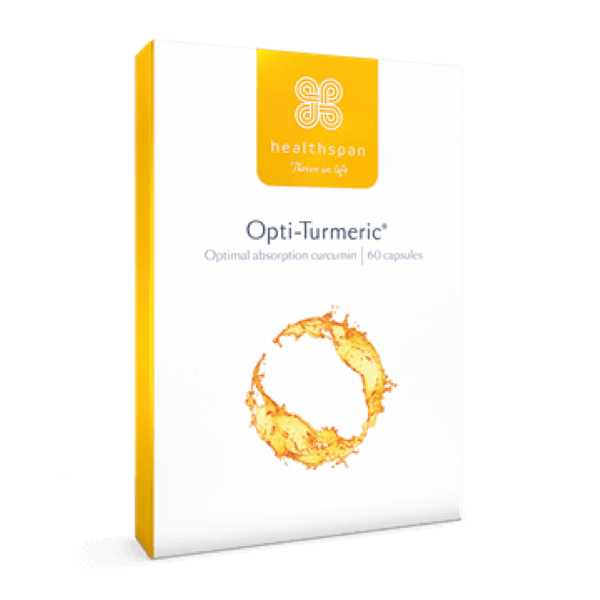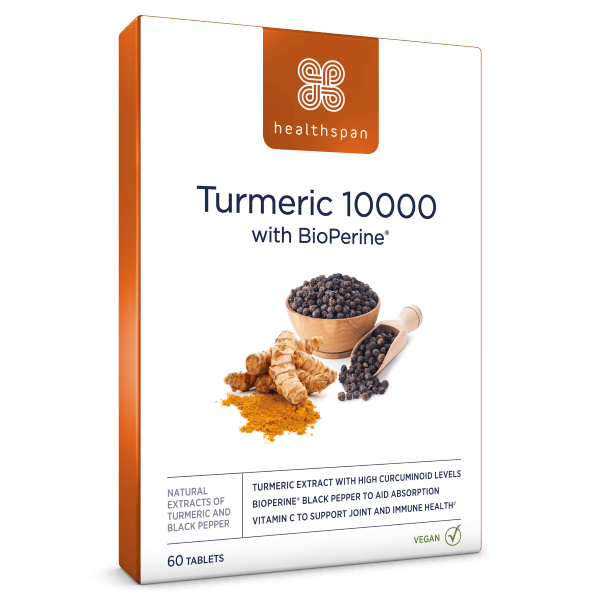Much of the research around turmeric is related to joint health, but increasingly attention is turning to how it can help maintain liver health and support good digestion. Jane Collins examines the evidence.
🕒 6 min read
What is turmeric?
Most of us are familiar with turmeric as the spice that adds a vibrant yellow-orange colour and a kick of flavour to curries. The active ingredient within turmeric is called curcumin, which is rich in anti-inflammatory and antioxidant compounds.
Turmeric has been used for centuries in traditional Chinese and Ayurvedic medicine to relieve joint pain and period pain, but more research is emerging into its effect on liver function, digestion and some gastrointestinal conditions.
Why supporting the health of your liver is important
As The British Liver Trust points out, "The liver is just as vital an organ as the heart, but people often fail to realise the importance of keeping it healthy." To show exactly why your liver might need a little extra support from a nutrient like turmeric, here's just a fraction of what it does each day:
It helps to facilitate fat digestion
Anything you consume with fat in it gets broken down by the liver using bile. This process turns fat into smaller particles, which can be excreted by the body.
It helps stabilise your blood sugar
The liver works with the pancreas to balance blood sugar after you've eaten. If blood sugar rises, the liver filters the glucose and stores it as glycogen. If your blood sugar gets too low, the liver breaks down glycogen and releases it into the bloodstream to compensate.
It helps protect you from infections
If your body gets an infection, the liver releases cells known as phagocytes. These detect and eliminate bacteria and viruses, especially those that affect the digestive system. If your liver function is impaired in any way, so is your ability to fight infection.
Is turmeric good for the liver?
There is evidence to suggest that turmeric's active ingredient, curcumin, has cleansing and anti-inflammatory effects in the liver, and can help manage fat deposits.
A liver cleanser
It's been suggested that curcumin's antioxidant and anti-inflammatory actions could improve the health of your liver by acting as a natural liver cleanser. Curcumin is thought to help with the process of flushing out toxins from the body (including fats, common medications like painkillers and alcohol) and thus to generally help support the health of your liver.
Managing cholesterol
By helping to clear out excess cholesterol, turmeric may help to reduce fatty deposits in the liver and reduce liver inflammation.
One study involved 75 people being given turmeric supplements in varying doses from 15mg to 60mg, in order to ascertain the effect on cholesterol and triglycerides (a type of fat in the blood.)
The study showed that those taking the lower dose of curcumin three times daily had a greater reduction in overall cholesterol and higher levels of HDL ('good') cholesterol. Their levels of triglycerides remain unchanged.
Another small study carried out on healthy middle-aged people given 500mg of turmeric daily for just one week revealed a 29% increase in HDL ('good') cholesterol and a 63% reduction in total cholesterol.
Treating fat build-up in the liver
Non-alcoholic fatty liver disease (NAFLD) is caused by a build-up of fat in the liver. The British Liver Trust estimates that one in five adults in the UK are affected by it. It is usually – although not exclusively – seen in people who are overweight or obese.
Adopting a healthier lifestyle is the main way of preventing, and treating, NAFLD. This includes maintaining a healthy weight, eating a balanced diet and exercising regularly. Although NAFLD is not caused by alcohol, drinking does appear to exacerbate symptoms.
Several studies suggest that turmeric can play a role in treating NAFLD. In one study, a group of people were given 500mg of curcumin daily, and another a placebo, over the course of eight weeks. The curcumin group showed a 78.9% reduction in liver fat content compared to placebo.

Opti-Turmeric
7 times faster-acting than standard turmeric
- Advanced liquid curcumin capsules
- Faster-acting and better absorbed than standard turmeric
- 500mg turmeric per capsule
Is turmeric good for digestion?
Gut health is vital for anything from immunity to energy to mental health, and turmeric's effects on gastrointestinal health are also looking promising.
A treatment for indigestion
A new study published in the journal BMJ Evidence Based Medicine suggests that the curcumin in turmeric may be as effective in treating indigestion (dyspepsia) as a medication called omeprazole.
The double-blind, placebo-controlled trial involved over 150 people aged between 18-70 who suffered with recurrent stomach upsets, and split them into three different treatment groups: looking at how they responded to omeprazole, 2 grams of turmeric daily, or a combination of the two.
The patients in all three groups experienced an improvement in symptoms, suggesting that the turmeric could treat indigestion as effectively as the omeprazole.
Omeprazole – a proton pump inhibitor (PPI) – is widely used to treat indigestion, heartburn and acid reflux by reducing the amount of acid your stomach makes. Why this study is significant is that long-term use of PPIs like omeprazole has been linked to unwanted side effects like vitamin B12 deficiency, an increased risk of fractures, and gut infections.
Although the researchers acknowledge the need for larger and more long-term studies, they concluded that these results 'may justify considering curcumin in clinical practice.'
More diverse gut microbiome
One of the indicators of good gut health is having a diverse gut microbiome. In several animal studies curcumin has been shown to positively influence the diversity of our gut microbiota – the microbes in our gut.
One small study carried out on eight healthy adults involved them fasting for 12 hours and then being given a curry either with or without turmeric. The turmeric group were found to have a more diverse range of gut bacteria plus improved bowel motility: the time it takes for food to transit through the bowel.
Another clinical trial involving giving turmeric and black pepper supplements to adults saw a seven per cent increase in gut diversity compared to a placebo group, who saw a 15 per cent decrease in theirs. These positive effects on gut health could also have a knock-on effect on brain health – the bi-directional links between the gut and the brain (gut-brain axis) are well documented – so the suggestion is that turmeric could also have neuroprotective properties.
Improvements to 'leaky gut', IBS and ulcerative colitis
The anti-inflammatory and antioxidant effects of turmeric also appear to help with gut inflammation and gut permeability ('leaky gut') – both seen as measures of digestive health.
Turmeric is also being explored for its effects on Irritable Bowel Syndrome (IBS). A pilot study from 2004 found that patients with IBS who took two turmeric tablets daily for eight weeks reported less abdominal discomfort and improved bowel habits at the end of the trial.
Another study has looked at how turmeric can help those with ulcerative colitis: a chronic digestive condition that causes abdominal pain and diarrhoea. It found that curcumin appeared to be a safe and promising treatment when combined with a regular treatment routine.
Any drawbacks?
Despite evidence of turmeric's benefits, one major criticism is that it can be hard for the human body to absorb and use. One way to increase this bioavailability is to take turmeric with piperine – commonly found in black pepper.
When buying a turmeric supplement, you should choose one containing black pepper. Liquid forms of curcumin are also more bioavailable than powdered versions, so bear this in mind when looking for a better-absorbed turmeric supplement.

Turmeric 10000 with BioPerine®
With black pepper extract to help absorption
- 500mg high-strength turmeric extract (equivalent to 10000mg whole turmeric root)
- Added BioPerine® black pepper to aid turmeric absorption in body
- Added vitamin C to support joint, bone, and immune health
Is there anyone who shouldn't take turmeric?
Turmeric does have a good safety profile, but if you already take blood-thinning medication you shouldn't take turmeric (it's a natural blood thinner). If you have been diagnosed with diabetes you should also avoid turmeric, as it can interfere with blood sugar regulation. Those with bile problems should also not take it.
How much turmeric should you take?
500mg daily is a safe dose (the equivalent of 10,000mg of whole turmeric root.)







